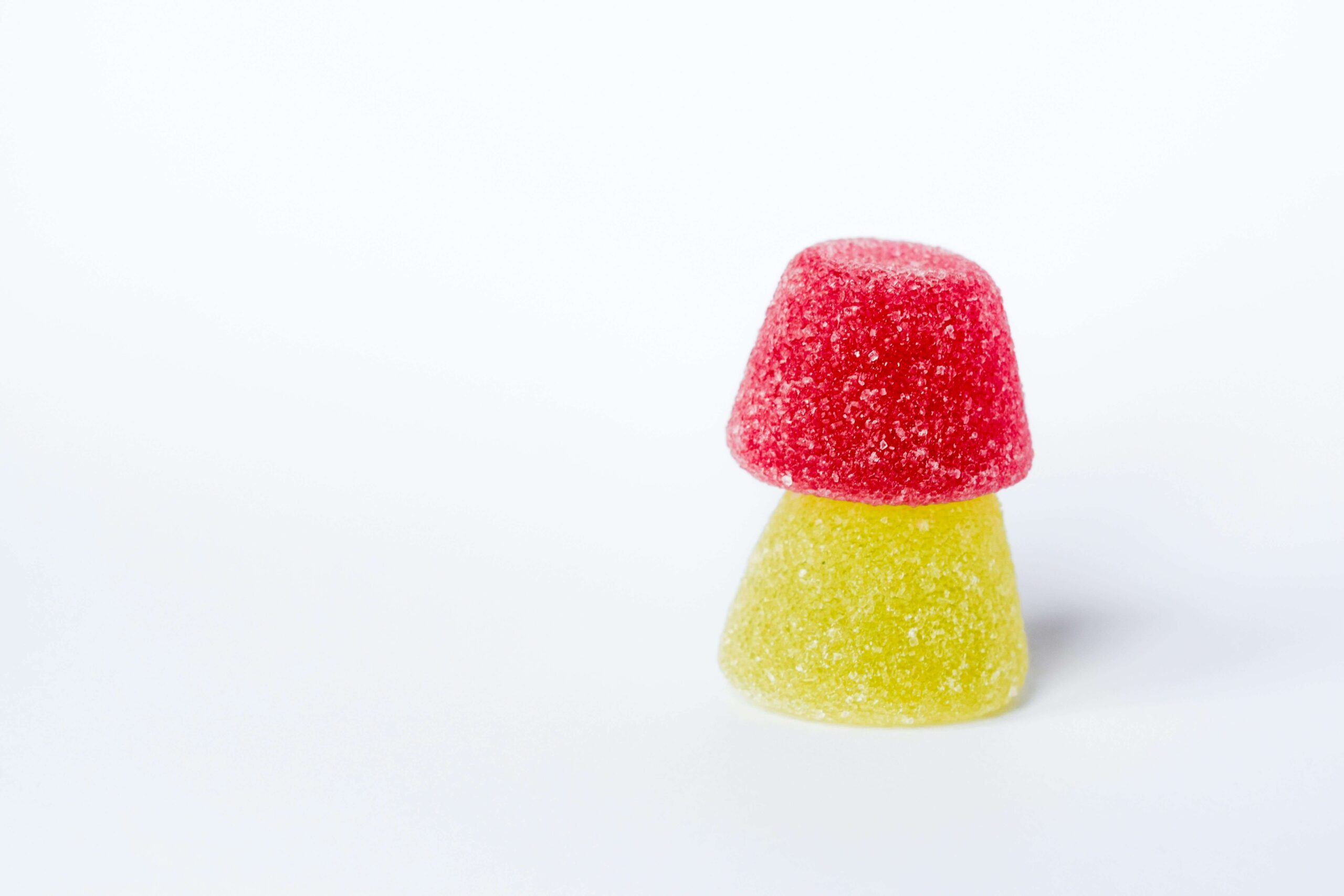Whether you’re a casual consumer or a cannabis enthusiast, gummies offer a convenient and delicious way to enjoy your high. They’re tasty, portable, and easy to portion out. But, like all things edible, gummies eventually go bad. Understanding their expiration dates and signs of spoilage can help you minimize risks and ensure you have the cannabis experience you were hoping for. At Sky’s The Limit, we’re dedicated to helping you have the best cannabis experience possible. In this blog, we cover the sticky truth about expired weed gummies, from how to keep them fresh to how to spot when they’ve gone bad.
Do Edible Gummies Expire?
Gummies contain perishable ingredients; like all perishables, they have a shelf life. Sometimes, shelf life is expressed as a “best by” date, and sometimes it appears as an expiration date. Like other foods, these dates are more of a guideline than an exact science. Eating your gummies after the expiration date won’t necessarily lead to adverse effects, but to have the best experience, we recommend you enjoy your gummies before that date.
What Happens if You Eat Expired Edibles?
Eating expired gummies generally carries very low risk, especially if you have stored them properly. However, every gummy is different, and every cannabis consumer is different. So, there’s no guarantee that eating expired gummies won’t harm you. It’s best to learn what to look for and use your judgment when eating gummies that are past their prime.
Change in Taste and Texture
Gummies are a lot like regular candy, just with added THC or CBD. And, like regular candy, the taste and texture of gummies will change once they’ve expired. Expired gummies might be tough and harder to chew or taste a bit off. These changes aren’t typically dangerous but can create an unpleasant gummy experience.
Loss of Potency
The food ingredients of your gummies — like the sugar and oil — aren’t the only parts of the gummy that go bad. The cannabinoids and terpenes also diminish with time, so your gummies can lose their potency. That makes for an underwhelming experience and could mislead you into believing that the gummies you purchased were ineffective. Checking the expiration date can help you determine whether you’re eating weak gummies or if you’re simply eating expired ones.
Gastrointestinal Discomfort or Illness
If you’ve opened your gummies and stored them near other foods or in an area susceptible to moisture, they might become contaminated. Gummies left on the shelf for a long time can come in contact with bacteria and develop mold. This can lead to unwanted side effects like nausea and digestive issues. The severity of these issues varies from person to person, depending on sensitivity.
Risk of Allergic Reactions
If you’re allergic to mold or bacteria that’s come in contact with your gummies, you could have a reaction. Symptoms can vary from itching and swelling to more serious complications like difficulty breathing, wheezing, or dizziness.
Signs Your Gummies Have Gone Bad
Sometimes, a simple eyeball test can tell you if it’s time to toss out your treats. Here are general tips for confirming the freshness of your gummies:
- Check the packaging. You should be able to find a best-by or expiration date on the packaging. Some even have QR codes you can scan to learn when the gummies were made.
- Look for visual changes. Faded coloring, signs of mold, and crystallization are all visual signs that your gummies are no longer good.
- Check for texture or consistency changes. Gummies that have become harder or softer have likely gone bad. Texture changes aren’t necessarily dangerous but can lead to an unappealing snacking experience.
- Sniff for an off-putting smell. Give your gummies a whiff. If they smell chemically, sour, or musty, it’s time to toss them out.
The good news is you can use many of the same methods you’d use to check the edibility of your food to check your gummies. Your nose and eyes can tell you a lot, so go with your gut. If something seems off, throw out your gummies.
How Long Do Edible Gummies Take to Expire?
Gummies have an average shelf life of six to 12 months when unopened. Still, it’s always best to check the manufacturer’s use-by date and go by that. Once you’ve opened your gummies, consume them within one to two months. These are general guidelines, but several factors will impact the longevity of your gummies.
Factors Determining Freshness
There are a handful of factors — including steps you can take — that will impact how long your gummies stay fresh:
- Ingredients and preservatives. Some gummy manufacturers add preservatives, which increase the shelf life of your gummies. However, ingredients like dairy or fruit will generally mean they expire sooner. Generally, the fresher the ingredients, the sooner your edibles will go bad.
- Storage conditions. High temperatures, light, and humidity can all cause gummies to deteriorate ahead of their time.
- Packaging integrity. Airtight and/or vacuum-sealed packaging is best for keeping gummies fresh. It prevents exposure to air and moisture, two enemies of fresh gummies.
- Open vs closed. The deteriorating process will speed up once you’ve opened your gummy packaging. Keeping your gummies closed until you’re ready to eat them will extend their freshness.
These factors serve as helpful guidelines — not hard and fast rules. Always check for signs of spoilage before consuming your gummies.
THC vs CBD
THC degrades faster than CBD, so THC gummies have a shorter shelf life than CBD gummies. THC has a fragile molecular structure, making it more sensitive to environmental factors like light, temperature, and humidity. Proper storage is important for both types of gummies, but especially so for THC treats. Letting these go bad can lead to a mild or even non-existent high.
Expiration vs. Manufacture vs Best By Dates
When evaluating your gummy packaging, you might see one of several dates. Understanding what each means can help you more accurately determine the freshness of your product. Here are three dates to be aware of:
- Expiration date. The expiration date is when a product has gone bad and is no longer safe to consume and/or won’t produce the desired effect.
- Manufacturing date. This date tells you when the product was made, which can give you additional information about its lifespan.
- Best-by date. This is the date by which the manufacturer recommends you consume the product for the best experience.
Even if neither the best-by nor expiration date has passed, it is always a good idea to examine your product for freshness. Improper storage or damaged packaging can cause gummies to go bad before their expiration dates.
How to Increase the Shelf Life of Your Gummies
So, you’ve put in the time to find a great gummy that delivers the experience you’re after. Make the most of it by storing it properly to keep it fresh and potent. Here are tips on extending the shelf life of your gummies:
- Avoid high temperatures. Keep your gummies in a cool place. Heat can speed up their deterioration.
- Store them in a dark place. Light exposure is another factor that can cause your gummies to go bad fast.
- Maintain humidity levels. When humidity levels are too high, mold and bacteria can develop. However, low humidity levels can also impact the quality of your gummies. Consider buying humidity packs designed to maintain the proper humidity for cannabis products.
- Don’t take a bite. If you don’t want a whole gummy in one session, use a sterile knife or cutting tool to slice off your desired amount. Biting into it exposes the gummy to your mouth’s bacteria.
- Consider freezing or refrigeration. Refrigerating or freezing gummies can extend their shelf life. Always store them in an airtight container.
Following these storage tips will maintain the quality of your gummies and the experience they deliver and minimize safety concerns like mold and bacteria contamination.
Shop Premium Gummies with Sky’s the Limit
Want to have the best experience with your edibles? Always check them for signs of spoilage, and refresh your stash if you need to. At Sky’s the Limit, we have a selection of premium CBD gummies made with quality ingredients to deliver the perfect experience. Our cannabis experts can guide you in selecting the gummies with the right profiles for your goals, whether you’re looking to get creative, get social, or just chill out. We’re always happy to answer your questions about safe handling and storage, whether for gummies or our other top-shelf products, so contact us today to speak to one of our knowledgeable team members.
FAQs
Want to learn more about gummy freshness and storage best practices? We’re dedicated to educating the cannabis community in the hopes of helping you have the best experience possible. Below, we answer the top questions about these tasty treats.
Are expired edibles safe?
While expired edibles usually aren’t dangerous, they might not produce the experience you’re hoping for and might have a taste or texture that’s off. In some cases, if gummies have developed mold or bacterial growth, they can cause unwanted side effects like allergic reactions and gastrointestinal issues.
How can you tell if gummy edibles are bad?
Signs your gummies have gone bad include an odd smell, sour or diminished flavor, faded color, change in texture, and/or reduced potency.
How long do gummies last after the expiration date?
So, how long do weed gummies last after the expiration date? Unfortunately, there’s no exact answer to this question. Many factors, including the ingredients, whether or not the package has been opened, and the storage methods influence how long gummies last past the best-by date.
Do edibles get stronger after they expire?
No, edibles lose their potency after the expiration date. Consuming your edibles long after the expiration date might create a muted effect or no effect at all.
Do THC gummies expire faster than CBD?
Yes, THC is more structurally fragile than CBD, so it’s more sensitive to light, high temperatures, and moisture exposure and deteriorates faster than CBD.
Do gummies go bad in the fridge?
If kept long enough, gummies can go bad in any environment. However, putting them in the fridge can keep them fresh longer.
Can you freeze edibles?
Yes, you can freeze edibles. Individually wrap baked goods in freezer-safe materials. Store gummies in airtight containers. Freezing edibles can extend the shelf life by anywhere from six to 12 months — sometimes longer.



